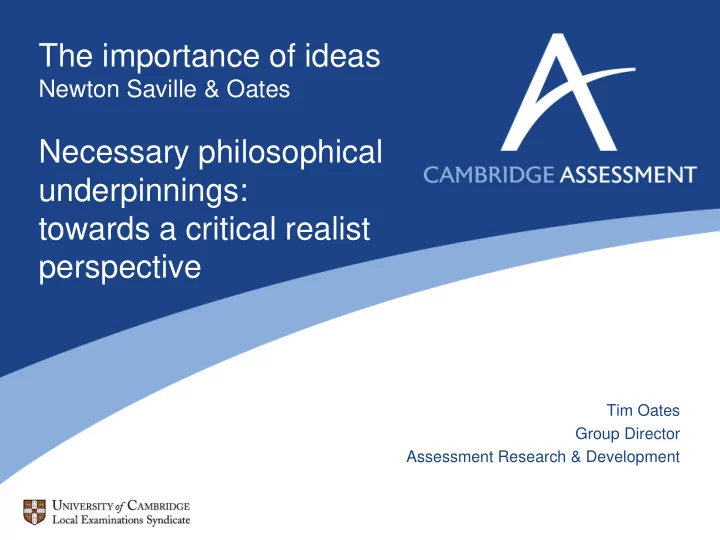

The importance of ideas Newton Saville & Oates Necessary philosophical underpinnings: towards a critical realist perspective Tim Oates Group Director Assessment Research & Development
Assessment
Assessment Culture Context
Assessment Culture Context Impact
Assessment Culture Explanation Context Impact
Assessment Action Culture Explanation Context Impact
Assessment Action Culture Explanation Context Impact
Why bother about philosophy? Because perception and action is theory-laden (Fleck, Kuhn, Polanyi, Feyerabend, Kriege, Boden) Because it makes life easier Because it enables context, impact and cause to be better understood It seems esoteric – but ultimately it is prosaic Theory determines what you look for, and what you observe Explanation Causal relations Prediction Action - praxis
‘…well, it may be all right in practice, but it will never work in theory…’ Warren Buffet (an implied criticism of econometricians)
David Carless Berlin Nov 2012 Analysis of the implementation of AfL in Hong Kong ‘…my mother is like a policewoman….’
Semiotic ‘signs’ of culture – ‘you can’t change culture’ Defining culture as restriction: constrained practise and thought Culture as ‘exotic’, interesting and intriguing Cutlure as systematically repressive
Semiotic ‘signs’ of culture – ‘you can’t change culture’ Defining culture as restriction: constrained practise and thought Culture as ‘exotic’, interesting and intriguing culture as an explanatory factor culture as an element of policy Cutlure as systematically repressive
Semiotic ‘signs’ of culture – ‘you can’t change culture’ Defining culture as restriction: constrained practise and thought Culture as ‘exotic’, interesting and intriguing culture as an explanatory factor culture as an element of policy Cutlure as systematically repressive
Methodological antecedents Margaret Archer Andy Green David Raffe Philips and Ochs Alexander Stigler & Stevenson Schmidt & Prawat Oates & Coles OCED Hegel Gramsci Salter & Tapper Polanyi Bhaskar Sayers
Analytic concepts • dialectical transformation of transitive systems • objective forces • Ideology • overdetermination • false consciousness • enacted/constructed curriculum
Judging the qualities of theory • Explanatory power • Causal power • Predictive power Popper, Kuhn, Merton, Bhaskhar
Post-modernism Form 1 Enhanced explanation of power and control, and of constructed reality Form 2 The uniqueness of formation – and the impossibility of dependable intersubjectivity
Post-modernism ‘…I don’t believe in a knowledge - based curriculum…’ Recent quote from an exchange on the revised National Curriculum The irreducibly oppressive and repressive nature of cultural reproduction Althusser, Alexander The problem of ‘culture’ Alexander The debased concept of ‘control’ and more progressive expression Schmidt & Prawat
Explaining Finland High autonomy Low accountability (absence of national assessment and inspection) Small nation, homogenous society Long tradition of literacy and home learning National curriculum for 120 years High levels of social debate Coherent policy formation Dirigiste control in improvement phase High levels of inspection, state approved textbooks, initial training as restriction, ‘the steering mechanisms of education’ Models of ability and uniform commitment to comprehensive education Commitment to high equity and high attainment
Explaining Finland High autonomy Low accountability (absence of national assessment and inspection) Small nation, homogenous society Long tradition of literacy and home learning National curriculum for 120 years High levels of social debate – formation of ideas and of consensus Coherent policy formation Dirigiste control in improvement phase High levels of inspection, state approved textbooks, initial training as restriction, ‘the steering mechanisms of education’ – control Models of ability and uniform commitment to comprehensive education Commitment to high equity and high attainment
Explaining Finland Shared ideas (culture) are highly instrumental in the success of the system What if the concensus around the ideas begins to break down? Explanatory power Causal power Predictive power
Explaining any social system If post- modernism can’t explain Finland, what can? The power of a critical realist ontology
Light: Particle or wave? Explanatory power Causal power Predictive power Theory Theory Theory Etc. v1 v2 v3
Women: Intelligent in the same way as men? Explanatory power Causal power Very limited predictive power Theory Theory Theory Etc. v1 v2 v3
Cohesion, culture and ‘control’ Explanatory power Causal power Predictive power
Curriculum control A system must exercise control , it is not that individual agencies should take control : ‘…our purpose in introducing alternative ways to govern curriculum…is not to advocate one approach or another. As analysis by Cochran-Smith and Fries (2001) indicates, disagreements about teaching and, by implication, curriculum, often divides along ideological lines, an outcome that occurs no matter how pragmatic the veneer. A functional approach, by specifying in advance the criteria that an effective curriculum-governance system must meet, lessens the tendency to judge these systems in terms of the political values they represent (eg regulation vs deregulation, public interest vs private interest…’ Schmidt W & Prawat R 2006 p656
Cohesion, culture and ‘control’ Ideas are both express the rationale embedded in education arrangements – and are constitutive of those arrangements – they exist partly by virtue of the ideas, not independently of those ideas Ideas count
Recommend
More recommend